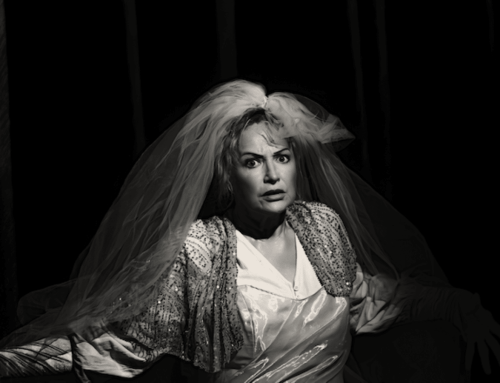Several popular mid-20th-century biographies of Hitler suggest his mother took young Adolf to her Jewish GP to treat his nightmares and bedwetting. The doctor, unsure what to do, suggested she take him to Dr Sigmund Freud, who was then working at the Vienna General Hospital. But her violent, abusive husband forbade it. What if she had disobeyed him, and the moody, stubborn, quarrelsome young Adolf had ended up on Freud’s couch? The question, addressed by renowned screenwriters Laurence Marks and Maurice Gran in Dr Freud Will See You Now, Mrs Hitler, is thought-provoking, but flawed. As is the play.
The problem is that there is little verifiable historical evidence to suggest that young Adolf (Sam Mac, excellent) ever suffered nightmares and bedwetting. The story is best understood as an urban myth created by later psychoanalytic-influenced writers who tried to link Hitler’s adult personality back to speculative childhood quirks. Their logic is: the man was a monster; therefore, he must have had childhood trauma, speculatively, nightmares and bedwetting.
The premise of Dr Freud Will See You Now, Mrs Hitler is teleological nonsense, and even writers of the calibre of Marks and Gran cannot quite disguise it. In the show blurb, the writers tell us the play is ‘the most difficult we have ever written’. It shows. Guys, sorry, but bedwetting did not cause the holocaust. Reading childhood through the lens of what happened later, however neatly packaged the narrative (not particularly neatly packaged here), is a fool’s errand.
The point is that presumably, dozens of young Austrian boys had strict fathers, failed exams, loathed Jews, and were lazy and temperamental. They did not become genocidal dictators. Hitler was, uniquely, the wrong man in the wrong place at the wrong time. Oddly simplistic cod psychological speculations about one man tell us little about his place and the time, and have precious little to say to us about modern-day counterparts.
Marks and Gran first see a bruised, beaten 8-year-old Adolf attend Freud’s clinic. “Does he complain of a lack of living space?” Freud (Jonathan Tafler) asks his Mum, Klara (Nesba Crenshaw, good, if only she had more to do). The meeting impresses the young Hitler. A decade or so later, he heckles the Doctor at a lecture. “Do you remember me?” Hitler asks. “You sought me out”, Freud replies. Buy why? They go for coffee and cake. Freud employs the painter for domestic renovations, and inevitably, the younger man ends up on the couch. “The key to your problem is your relationship with your father,” Freud suggests.
Hitler, enamoured of Freud’s young teenage daughter Anna (Ruby Ablett), stalks the family to their summer holiday villa in Berchtesgaden. Freud, just like Hitler’s dad, rejects him. The die is cast. “He’s a creature of dreams”, Freud opines, one day he may “destroy the world to save his ego”. Otto Rank (Brendan Lyle) and Carl Jung (Neil Chinneck) appear as foils for Freud’s speculations, essentially summarised, Hamlet-like, as “Is any man free of the ghost of his father?”
Later, we see Hitler in a hospital bed in the aftermath of the First World War. Freud tells Adolf the way to resolve his temporary blindness is to dedicate himself to saving his country. Not great advice, in retrospect. Soon after, Anna refuses to accompany Hitler to the opera: bad choice, Anna. By this time, in the most consequential episode of patient/therapist transference in the history of humanity, Freud, and by extension all Jewish people, have somehow, in Hitler’s mind, transmuted into his loathed, rejecting father. The duo met one more time in 1938, shortly after the Anschluss. Has Adolf finally won his father’s (AKA Freud’s) respect? As psychobabble goes (which is not very far at all), it is as good or bad as anything else.
Dr Freud Will See You Now, Mrs Hitler began life as a radio play in 2007, and it shows. The first half is a series of rapid scene changes that probably work well in audio (or on screen) but feel awfully clunky on stage. The much better second half settles down and finally fires to life in the tightly written emotional showdown between Freud and Hitler, though it is a dreadfully slow burn to get there. A plot complication arises when Adolf uses Freud’s writings to guide his political machinations (“without your scorn and your books I’d never have succeeded”). Another occurs when notes from the duo’s meetings threaten to leak to the press. Neither theme is really explored.
Isaac Bernie Doyle’s direction is workmanlike, but there are only so many ways you can get your actors to shift a couch onstage and off. Mac effectively tracks his character’s journey from oversensitive, pompous, and defensive youth to something much darker. Tafler impresses too, though there is something of the archetypal Jewish therapist in his portrayal.
Writer: Laurence Marks and Maurice Gran
Director: Isaac Bernie Doyle
New – Online Shop!
My collected theatre reviews now available in paperback format for the years 2022 and 2023.
Just £10 per copy.
Over 100 reviews in each book.
- John Cutler’s Collected Theatre Reviews – Volume One. 2022. Paperback. 296 pages. ISBN 9781805179757. £10
-
John Cutler’s Collected Theatre Reviews – Volume Two. 2023. Paperback. 284 pages. ISBN 9781836884170. £10
Visit my Online Shop or click on Buy Now to order your copies.
More Recent Reviews
The Sea Horse. Golden Goose Theatre.
The Sea Horse, Edward J Moore’s grim slice of mid-century realism, debuted to solid reviews off-Broadway in 1974. Since [...]
Garry Starr: Classic Penguins. Arts Theatre.
Emperor penguins’ shortish treks between sea and nesting sites are about as peripatetic as your average Thameslink commuter. Garry [...]
When the Clarion Came to Call. Cockpit Theatre.
When, upon entering an auditorium, you are told, ‘Take as many pictures as you like, but mind the ceramics,’ [...]







